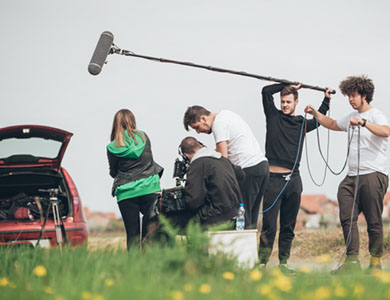
A shorter working day would change everything. Without it, I'm not sure I can continue in the industry, and continue to be exhausted, with hardly any social life or life outside of work.”
Survey respondent

We’ve shadowed two live productions to create a commercially viable blueprint for shorter working days for film and TV crew.

By Emma Stewart, Co-Founder, Timewise
Is it a given that working in a creative industry means working all hours? It doesn’t seem right, but it’s certainly the reality of life on set for film and TV crews, where 10+ hour days are not just the norm, they’re hard-wired into production schedules.
And while this has long been the case, things have got worse in recent years. The pandemic and its fallout put significant pressure on people in the industry – 86% of whom experience mental ill-health – and made it harder than ever to hang on to experienced crew. More recently, strikes have caused work to dry up again – and as things are starting to go back to normal, long hours are too. All of which is creating a growing perception that the status quo isn’t sustainable.
I can speak from experience, as one of the thousands of people who left a career in film and TV due to the impossibility of combining the job I loved with the needs of my young family. So I leapt at the chance to explore the options for introducing shorter working days for film and TV crews; to quote Jaws: The Revenge, “This time, it’s personal.” And our findings are now available in our new report.
We began our work in this field in 2022, with an action research project that explored potential opportunities to improve flexible working within the industry. The project was carried out in partnership with BECTU Vision and Screen Scotland, and it indicated that the main challenge was the length of the working day.
So in April 2023 we embarked upon a second phase, supported by BBC Drama Commissioning and The Film and TV Charity as well as our original partners, which set out to see whether productions based on shorter days could be commercially and logistically viable. The question we set ourselves was, Is it possible to go from a 10-hour working day to an eight-hour one, without a detrimental effect on budgets and schedules? (Spoiler alert – yes, it is.)

A shorter working day would change everything. Without it, I'm not sure I can continue in the industry, and continue to be exhausted, with hardly any social life or life outside of work.”
Survey respondent
We kicked things off with some desk research, which saw us interviewing industry leaders, commissioners and independent production company staff, and exploring successful models from Sweden and Australia.
We also surveyed 800 film and TV crew members, to find out what their preferences would be, and the results were clear. Not only did a staggering 98% say they were interested in a shorter working day, 71% of those said they would be prepared to reduce their day rate in order to work fewer hours.
So, armed with our findings, we created a blueprint for an eight-hour day – and took it on set to stress-test it.
Our team visited two live productions in Scotland, shadowing their work and talking to everyone involved, from commissioners, writers and cast to crew members, directors and editors. We asked them to consider what they could be doing differently at each stage to adapt to a shorter working day; and by doing so in the moment, were able to capture some unusually granular detail about what would (and wouldn’t) work.
As you can probably imagine, our findings were broad and deep; you can read them in full in our report. But key takeouts included:
We’ve used all our findings to revise our blueprint, creating a retrospective budget and schedule for both productions, with support from Assistant Directors and Line Producers. We’ve also produced a set of guiding principles to help commissioners and production companies understand what good practice and efficiency planning looks like within an eight-hour working day.
So now we’re asking the industry to pick up where we’ve left off; to take our blueprint and guidelines from the report and pilot them on a live production. We’re already talking to several commissioners about making this happen, and would be happy to speak to anyone else who feels ready to blaze this trail. Film and TV is a highly creative industry, packed with creative people; it’s time to apply that creativity to the working day.
Published February 2024